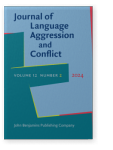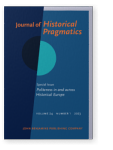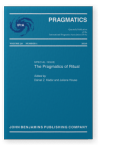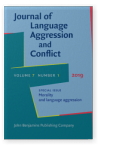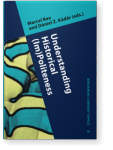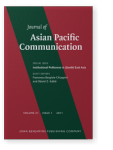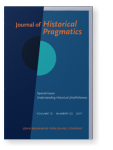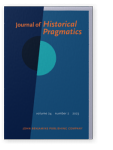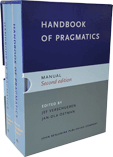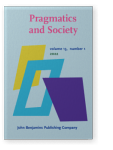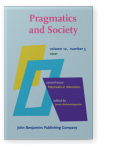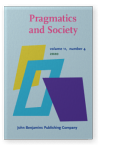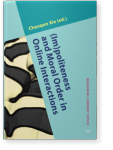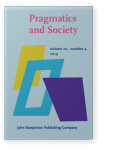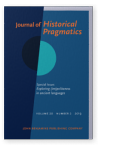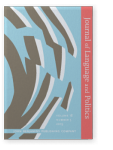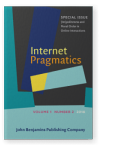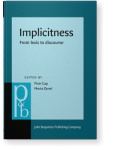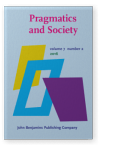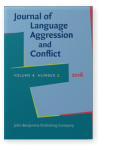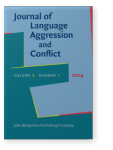Dániel Z. Kádár
List of John Benjamins publications for which Dániel Z. Kádár plays a role.
Journal
Politeness in and across Historical Europe
Edited by Annick Paternoster, Gudrun Held and Dániel Z. Kádár
Special issue of Journal of Historical Pragmatics 24:1 (2023) vi, 216 pp.
Subjects Discourse studies | Historical linguistics | Pragmatics
The Pragmatics of Ritual
Edited by Dániel Z. Kádár and Juliane House
Special issue of Pragmatics 30:1 (2020) v, 168 pp.
Subjects Discourse studies | Pragmatics
Morality and language aggression
Edited by Dániel Z. Kádár and Vahid Parvaresh
Special issue of Journal of Language Aggression and Conflict 7:1 (2019) v, 132 pp.
Subjects Communication Studies | Discourse studies | Pragmatics
Understanding Historical (Im)Politeness: Relational linguistic practice over time and across cultures
Edited by Marcel Bax and Dániel Z. Kádár
[Benjamins Current Topics, 41] 2012. vi, 283 pp.
Subjects Historical linguistics | Pragmatics
Institutional Politeness in (South) East Asia
Edited by Francesca Bargiela and Dániel Z. Kádár
Special issue of Journal of Asian Pacific Communication 21:1 (2011) vi, 158 pp.
Subjects Afro-Asiatic languages | Altaic languages | Communication Studies
Understanding Historical (Im)Politeness
Edited by Marcel Bax and Dániel Z. Kádár
Special issue of Journal of Historical Pragmatics 12:1/2 (2011) vi, 313 pp.
Subjects Discourse studies | Historical linguistics | Pragmatics
2024 Chinese “face”-related expressions in Peking and Teochew Opera scripts: A historical contrastive pragmatic inquiry Journal of Historical Pragmatics: Online-First Articles | Article
This paper presents a historical contrastive pragmatic study of the use of Chinese “face”-related expressions in Peking and Teochew Opera scripts. The rationale behind this investigation is that contemporary Mandarin and the Minnan Dialect operate with very different inventories of… read more
2024 Capturing power in diplomatic language use: The case of a closed-door mediatory negotiation and its aftermath during the breakup of the former Yugoslavia Journal of Language and Politics: Online-First Articles | Article
In this study we capture power dynamics in diplomacy from a pragmatic angle, by examining a closed-door diplomatic mediatory negotiation and its aftermath. We first analyse the transcript of a mediation session between representatives of Slovenia and Croatia and a European Economic Community… read more
2023 Historical language use in Europe from a contrastive pragmatic perspective: An exploratory case study of letter closings Politeness in and across Historical Europe, Paternoster, Annick, Gudrun Held and Dániel Z. Kádár (eds.), pp. 143–159 | Article
This paper presents a case study which brings together the fields of contrastive pragmatics and historical pragmatics. Specifically, we contrastively investigate the ways in which the speech act set of “farewell” – representing the closing phase of an interaction – was realised in… read more
2023 Introduction: Politeness in and across Historical Europe Politeness in and across Historical Europe, Paternoster, Annick, Gudrun Held and Dániel Z. Kádár (eds.), pp. 1–15 | Introduction
2023 Beyond the deferential view of the Chinese V pronoun nin 您 Pragmatics: Online-First Articles | Article
In this paper, we revisit the long-held assumption that the Chinese second-person V pronoun nin
您 is an essentially ‘deferential’ pronoun. We examine uses of nin in settings where disagreement occurs and where conventionally the T pronoun ni would be preferred. Our research follows a… read more
2022 Historical politeness Handbook of Pragmatics: Manual, Verschueren, Jef and Jan-Ola Östman (eds.), pp. 719–743 | Chapter
2022 Sociality and moral conflicts: Migrant stories of relational vulnerability Pragmatics and Society 13:1, pp. 1–21 | Article
This paper explores how understandings of sociality influence the way members of two different social groups discursively animate moral conflicts. It examines how moral conflicts are constructed in life-story interviews by Chinese and Latin American migrants as they reflect on patterns of… read more
2021 Review of Jucker (2020): Politeness in the History of English – From the Middle Ages to the Present Day Polymedia in Interaction, Androutsopoulos, Jannis (ed.), pp. 865–869 | Review
2021 Admonishing: A paradoxical pragmatic behaviour in ancient China Pragmatics 31:2, pp. 173–197 | Article
This paper examines the pragmatic properties of what we define as a ritual act of ‘admonishing’. We argue that admonishing represents a historically embedded realisation type of the speech act Suggest. We explore admonishing in ancient Chinese political and governance texts dated before the 2nd… read more
2020 Calling Mr Speaker ‘Mr Speaker’: The strategic use of ritual references to the Speaker of the UK House of Commons The Pragmatics of Ritual, Kádár, Dániel Z. and Juliane House (eds.), pp. 64–87 | Article
Prime Minister’s Questions (PMQs) in the UK House of Commons is a ritual event, governed by a cluster of conventions. Members of Parliament (MPs) must address their remarks to the Prime Minister (PM) through the medium of the Speaker of the House, who is responsible for maintaining order during… read more
2020 The socialisation of interactional rituals: A case study of ritual cursing as a form of teasing in Romani The Pragmatics of Ritual, Kádár, Dániel Z. and Juliane House (eds.), pp. 15–39 | Article
The present paper examines the ways in which ritual cursing operates as a form of teasing in (Gabor) Roma communities. By ‘ritual cursing’ we mean forms of curse that are believed to cause harm to the cursed person or people related to them, i.e. cursing studied here differs from swearing and… read more
2020 The pragmatics of ritual: An introduction The Pragmatics of Ritual, Kádár, Dániel Z. and Juliane House (eds.), pp. 1–14 | Article
This introductory position paper aims to familiarise the reader with the pragmatics of ritual and previous research in this field. Ritual is a complex pragmatic phenomenon present in many types of interaction, and it has been subject to academic inquiries in various disciplines. We will draw on… read more
2020 Ritual frames: A contrastive pragmatic approach The Pragmatics of Ritual, Kádár, Dániel Z. and Juliane House (eds.), pp. 142–168 | Article
Our study provides a corpus-based contrastive pragmatic investigation of the expressions please in English and qing
请 in Chinese. We define such expressions as ‘ritual frame indicating expressions’ (henceforth RFIEs) and argue that RFIEs are deployed in settings where it is important to… read more
2020 The meta-conventionalisation and moral order of e-practices: A Japanese case study (Im)politeness and Moral Order in Online Interactions, Xie, Chaoqun (ed.), pp. 149–173 | Chapter
This study overviews the phenomenon of the meta-conventionalisation of interpersonal practices in the context of computer-mediated communication. The term ‘meta-conventionalisation’ refers to the coding of the conventional interpersonal practices of a particular group, or various groups, in the… read more
2020 The rite of reintegrative shaming in Chinese public dispute mediation The Pragmatics of Ritual, Kádár, Dániel Z. and Juliane House (eds.), pp. 40–63 | Article
This paper examines the ways in which mediators deploy the rite of public shaming in the activity type of public mediation, as a pragmatic device by means of which they exert social control. Our data consists of episodes of public mediation events in rural China, aired in the Chinese Television.… read more
2019 Ritual frame and ‘politeness markers’ Pragmatics and Society 10:4, pp. 639–647 | Miscellaneous
2019 Introduction Exploring (im)politeness in ancient languages, Ridealgh, Kim (ed.), pp. 169–185 | Introduction
2019 Alignment, ‘politeness’ and implicitness in Chinese political discourse: A case study of the 2018 vaccine scandal Journal of Language and Politics 18:5, pp. 698–717 | Article
This paper aims to examine the ways in which official Chinese written monologues implicitly trigger alignment with the public in the wake of national social crises. Our understanding of alignment encompasses the attitude of creating an authoritative line of discourse, which in turn triggers the… read more
2019 Morality, moral order, and language conflict and aggression: A position paper Morality and language aggression, Kádár, Dániel Z. and Vahid Parvaresh (eds.), pp. 6–31 | Article
In this position paper, we provide an overview of what we regard as the most important features of the relationship between the moral order and morality in the context of language conflict and aggression. While in previous pragmatic research the concepts of morality and moral order have been… read more
2019 Morality and language aggression Morality and language aggression, Kádár, Dániel Z. and Vahid Parvaresh (eds.), pp. 1–5 | Introduction
2018 The meta-conventionalisation and moral order of e-practices: A Japanese case study (Im)politeness and Moral Order in Online Interactions, Xie, Chaoqun (ed.), pp. 352–378 | Article
This paper overviews the phenomenon of the meta-conventionalisation of interpersonal practices in the context of computer-mediated communication. The term ‘meta-conventionalisation’ refers to the coding of the conventional interpersonal practices of a particular group, or various groups, in the… read more
2017 Chapter 8. Indirect ritual offence: A study on elusive impoliteness Implicitness: From lexis to discourse, Cap, Piotr and Marta Dynel (eds.), pp. 177–200 | Chapter
The present chapter examines the phenomenon of indirect ritual offence, which includes cases of recurrent offences that are indirect and as such make it difficult for the targeted person to respond to them. Manifestations of indirect ritual offence include a series of indirect attacks that… read more
2017 The role of ideology in evaluations of (in)appropriate behaviour in student-teacher relationships in China Pragmatics 27:1, pp. 33–56 | Article
In this paper I examine Chinese perceptions of (in)appropriateness and offence from a cross-cultural pragmatic point of view, by exploring (in)appropriate evaluations in the context of a major social offence, and the influence of Confucian ideology on people’s evaluative tendencies. By doing so,… read more
2016 Rituals of outspokenness and verbal conflict Pragmatics and Society 7:2, pp. 265–290 | Article
This study examines rituals of outspokenness, by analysing cases drawn from the US hidden camera show, Primetime: What Would You Do? Studying ritualistic behaviour in cases when bystanders become side participants as they stand up for victims of abuse fills a knowledge gap in pragmatics. A further… read more
2016 Ritual, aggression, and participatory ambiguity: A case study of heckling Journal of Language Aggression and Conflict 4:2, pp. 202–233 | Article
This paper analyses the phenomenon of participatory ambiguity in aggressive ritualistic interactions. One can ‘participate’ (Goffman 1979, 1981) in an interaction in different statuses, and these statuses entail different interactional constraints and obligations, also within the realms of language… read more
2015 “Doing deference”: Identities and relational practices in Chinese online discussion boards Relational work in Facebook and discussion boards/fora, Locher, Miriam A., Brook Bolander and Nicole Höhn (eds.), pp. 73–98 | Article
In this paper we examine a key relational practice found in interactions in online discussion boards in Mainland China and Taiwan: ‘doing deference’. In drawing attention to a relational practice that has received attention in quite different research traditions, namely, linguistic pragmatics and… read more
2015 Historicity in metapragmatics – a study on ‘discernment’ in Italian metadiscourse Pragmatics 25:3, pp. 369–391 | Article
The present paper contributes to meta pragmatics, by examining the question of how historicity influences the validity of certain modern meta terms that are accepted as ‘neutral’ and ‘scientific’ in pragmatics. We argue that it is fundamental to explore the history and development of such meta… read more
2014 Heckling — A mimetic-interpersonal perspective Journal of Language Aggression and Conflict 2:1, pp. 1–35 | Article
The present paper aims to model the interactional operation of heckling, which has received little attention in impoliteness and interaction studies, despite the fact that studying this phenomenon has various advantages for the analyst. In order to fill this knowledge gap, I approach heckling by… read more
2013 Historical politeness Handbook of Pragmatics: 2013 Installment, Östman, Jan-Ola and Jef Verschueren (eds.), pp. 1–34 | Article
2012 The historical understanding of historical (im)politeness: Introduction Understanding Historical (Im)Politeness: Relational linguistic practice over time and across cultures, Bax, Marcel and Dániel Z. Kádár (eds.), pp. 1–24 | Article
2012 Relational ritual Handbook of Pragmatics: 2012 Installment, Östman, Jan-Ola and Jef Verschueren (eds.), pp. 1–40 | Article
2012 ‘Face’ across historical cultures: A comparative study of Turkish and Chinese Understanding Historical (Im)Politeness: Relational linguistic practice over time and across cultures, Bax, Marcel and Dániel Z. Kádár (eds.), pp. 25–48 | Article
This paper investigates the use of the word ‘face’ in late nineteenth- and early twentieth-century Turkish and Chinese so as to trace the meaning of the concept in the two languages and cultures. The study describes the occurrence of the lexeme in five semantic/pragmatic domains in novels dating… read more
2011 The historical understanding of historical (im)politeness: Introductory notes Understanding Historical (Im)Politeness, Bax, Marcel and Dániel Z. Kádár (eds.), pp. 1–24 | Article
2011 Institutional politeness in (South) East Asia: An introduction Institutional Politeness in (South) East Asia, Bargiela, Francesca and Dániel Z. Kádár (eds.), pp. 1–9 | Article
2011 ‘Face’ across historical cultures: A comparative study of Turkish and Chinese Understanding Historical (Im)Politeness, Bax, Marcel and Dániel Z. Kádár (eds.), pp. 25–48 | Article
This paper investigates the use of the word ‘face’ in late nineteenth- and early twentieth-century Turkish and Chinese so as to trace the meaning of the concept in the two languages and cultures. The study describes the occurrence of the lexeme in five semantic/pragmatic domains in novels dating… read more
